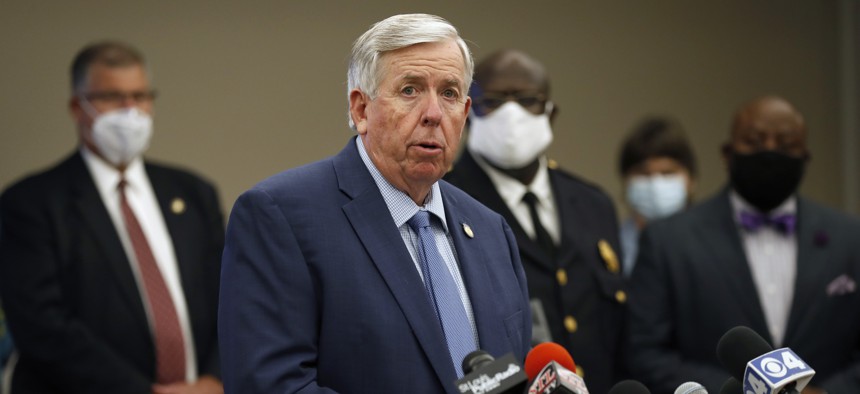In Missouri, a Rift Over Local Murder Prosecutions

Missouri Gov. Mike Parson speaks during a news conference Thursday, Aug. 6, 2020, in St. Louis. Officials announced St. Louis has been added to the list of cities that will receive federal assistance through Operation Legend. AP Photo/Jeff Roberson
Missouri’s governor wants the state attorney general to take over prosecutions for uncharged homicides in St. Louis.
Of 542 homicides committed in St. Louis over the last three years, charges have only been brought in about a quarter of the cases, according to the Missouri governor’s office.
With homicides continuing to surge in the city this year—162 through Monday compared to 120 at the same time last year—Missouri Gov. Mike Parson this week proposed bringing the state’s Attorney General to the table to assist. Under legislation proposed by the governor, Missouri AG Eric Schmitt could bring charges in homicide cases that are at least 90 days old and in which the St. Louis Circuit Attorney’s Office has not already filed charges.
While Parson said the legislation is not about taking away a local prosecutor’s authority, the proposal is deepening the rift between state officials and the St. Louis Circuit Attorney’s Office.
“It is clear that this legislation is not actually about addressing crime,” said St. Louis Circuit Attorney Kimberly Gardner in a statement. “Instead it serves as a vehicle to interfere with the clear discretion of a democratically elected local prosecutor.”
State lawmakers, who are currently in special session, would have to approve the bill.
Of the 162 homicides in St. Louis this year, charges have been brought in only 33 cases. Of 194 homicides in 2019 and 186 homicides in 2018, suspects have been charged in 101 cases, according to Parson’s office.
Federal authorities recently announced an initiative to combat violent crime in St. Louis. The Department of Justice-run program, which is also active in seven other cities, will bring 50 investigators and a $1 million grant to the city.
Jamila Hodge, director of the Reshaping Prosecution program at the Vera Institute for Justice, questioned state lawmakers’ insistence that Gardner has been lax in prosecuting people for homicide. Pointing to data from the St. Louis Metropolitan Police Department, Hodge said police only referred 27% of homicide cases to Gardner’s office in 2019 and 42% of cases in 2018.
That means in the majority of homicides those years, police either had no suspect or did not have enough evidence to support bringing a case, Hodge said.
Regarding all felony cases, Gardner said she has a conviction rate of 97%.
“Unprosecuted crimes in our community come down to two variables—lack of evidence and lack of community trust with law enforcement,” Gardner said. “Solving crime will take all of us working together not divisive political maneuvers such as this that are designed to usurp the will of the people."
Parson cited the lack of prosecutions in homicide cases as the motivating factor for his decision.
“This demonstrates a disturbing trend of not going after murders, which deprives victims of justice,” he said.
Schmitt, who like Parson is a Republican, would not supervise Gardner or have oversight of her cases if he is given authority to prosecute St. Louis cases, said the move was necessary because violent crime and homicides had “reached epidemic levels” in the city.
While it is not common for state prosecutors to seek jurisdiction over local prosecutions, it isn’t unheard of. In several recent cases, state officials have suggested taking over local criminal cases in an effort to undermine the discretion of those who support progressive criminal justice reform, Hodge said.
Recent similar examples include Maryland Gov. Larry Hogan’s 2019 request that the state attorney general independently prosecute violent crimes in Baltimore that were handled by the Maryland State Police. Baltimore City State’s Attorney Marilyn Mosby has spoken out against the plan, which state AG Brian Frosh said was unworkable without more resources for his office.
Another example occurred in Florida in 2017, when then-Gov. Rick Scott took 29 potential death penalty cases away from Aramis Ayala, the state attorney for the Ninth Judicial Circuit Court of Florida, after she said she would not pursue capital punishment in any cases her office handled. Ayala pursued legal action, but ultimately the Florida Supreme Court ruled the governor had the authority to reassign the cases.
In the Missouri, Florida and Maryland cases, each of the local prosecutors in question was a Black woman who had recently been elected as a Democrat on a platform of criminal justice reform, Hodge said. The governors they faced off against were all white, Republican men.
“These leaders in particular were Black women who were taking charge to do the job differently,” said Hodge, whose organization has worked with Gardner’s office in the past on data and policy reform matters. “It is about trying to take away power and discretion from someone.”
State officials have been at odds with Gardner over several other legal issues, including a recent highly publicized case in which a St. Louis couple pointed firearms at protesters passing by their home. Gardner filed an unlawful use of a weapon charge against Mark and Patricia McCloskey after the confrontation outside their home. Schmitt filed a brief in the case asking a judge to dismiss the charges and Parson said he would pardon the couple.
Andrea Noble is a staff correspondent with Route Fifty.
NEXT STORY: Do All Face Masks Offer Similar Protection? New Test Offers A Way to Compare





